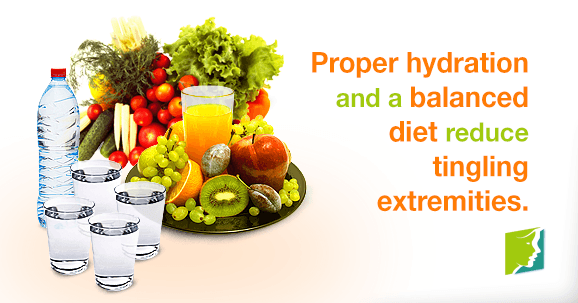The mysterious tingling sensations in your extremities may actually be a symptom of menopause. Fortunately, there may be steps you can take to prevent and lessen the tingling sensation, which is scientifically known as paresthesia. One way to get rid of tingling sensations is to make some lifestyle adjustments, so you can change anything that could be contributing to the tingling. However, not all tingling sensations are caused by menopause, and it can be a sign of a more serious condition. Therefore it is important to talk to a doctor if your tingling persists or does not seem to be a symptom of menopause. However, keep reading for five habits that can reduce and prevent tingling sensations and boost overall health during menopause.
Balance Diet
A balanced diet may help you relieve tingling sensations, and it also promotes overall health, fitness, and wellness. A diet that includes plenty of fresh fruit and vegetables, as well as a proper balance between carbohydrates and proteins, is good for overall health.
Exercise
Exercising can significantly reduce the risk of becoming obese. Since obesity and excess weight are one of the top contributors to developing constant tingling sensations in your fingers and toes, you should make an effort to exercise regularly. However, it's best to avoid high impact workouts if you have constant tingling until you have consulted your doctor. Instead, opt for cycling, swimming, or walking to keep your body in good health.
Hydration
Making sure you drink fluids throughout the day. Water intake is an essential step for good overall health, and therefore reducing the symptom of tingling sensations in your hands and feet. Current advice is to make sure that you drink at least eight glasses of water each day to ensure that you remain properly hydrated and that your body can function its best. You can get water not just from drinking it plain, but also from fruits and vegetables, smoothies, and juices.
Adequate Sleep
Fatigue can have a negative impact upon a range of different areas of your life and health. One of the symptoms of fatigue can be tingling sensations. Tiredness can cause heightened stress and anxiety levels, which can affect muscle tension, which can then impact the nerves in your face, fingers and toes, which causes tingling sensations.
Go to the Doctor
Chronic tingling sensations or paresthesia, can also be a symptom of serious conditions such as multiple sclerosis, or other neurological conditions, vitamin deficiency or malnutrition. It is important that if the tingling sensations you feel persists that you see a doctor, who can perform a more thorough examination and help you figure out if there is an underlying problem. However, temporary or short-term tingling and numbing is rarely a sign of something more serious. Treatments are available for tingling sensations and other menopause symptoms.
Sources
- Heller, J.L. (2011). Numbness and Tingling: MedlinePlus Medical Encyclopedia. Retrieved September 10, 2013 from http://www.nlm.nih.gov/medlineplus/ency/article/003206.htm
- US Office on Women's Health. (2010). Menopause Symptom Relief: Dealing with specific symptoms.Retrieved September 10, 2013 from http://www.womenshealth.gov/menopause/symptom-relief-treatment/index.html#b


